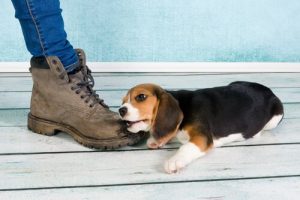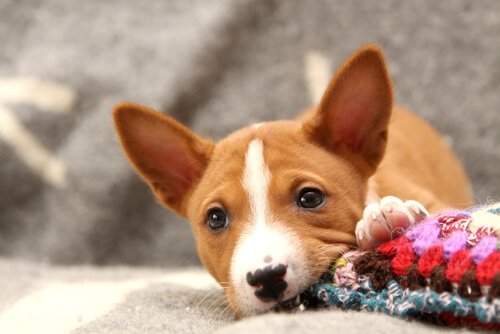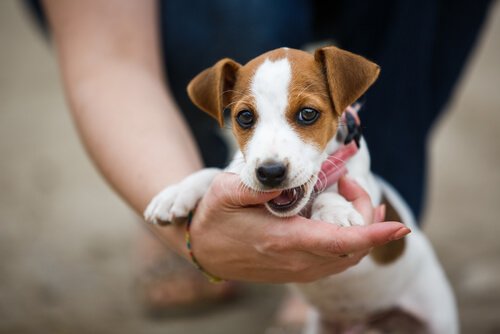What to Do When Your Puppy Chews On Everything

In the beginning your puppy might seem so sweet and calm…but that all changes once he grows up a little and feels more confident around you. If your puppy chews on everything in sight, then you should look at the tips below. where we come in!
Why is your puppy chewing on everything?
Before taking action on your dog, it’s important to understand why puppies like to chew so much. Once you more of an idea of why he chews, then you’ll become more patient and compassionate with your pet, and you’ll be better equipped to train him.
Chewing is a normal part of a dog’s cognitive development. It’s also a way for him to develop his jaw, familiarize himself with his surroundings, and explore scents and textures. It’s similar to how babies grab everything and put it in their mouths.
On one hand, when puppies’ teeth first start coming in, they need to chew to avoid pain and strengthen their teeth. If a puppy is especially active or isn’t receiving enough attention, he might chew as a way of not getting bored.

In fact, biting is one of the first things a puppy learns to do once he’s born. He bites his siblings and mother, which in turn teaches him how to control his strength and when to limit biting.
Despite this natural training, it’s possible that chewing is part of his daily life– and it involves anything he can find at home. How can you prevent this from happening? Here’s some advice.
What to do if your puppy chews on everything
Maybe you’re not sure what to do for your puppy to stop chewing on your slippers, furniture, or sofa. The puppy seems like he wants to destroy everything in his path, which naturally makes you nervous. This habit also can get expensive. But don’t worry! Everything has a solution by having patience and determination.

Socialization is essential
As of a young age, your dog should interact with other dogs. Remember, how important the imprinting phase is because you shouldn’t get a puppy until he’s at least three-months-old. That’s the time he needs to be with his mother and siblings, in order to learn how to behave and control his biting.
If your puppy spent those three months learning and is still chewing on everything, then have him be around other puppies and adult dogs. His young friends will keep him energized and responsive, and the adults will teach him how to behave. Plus, your pet will feel less bored and nervous, which will minimize his desire to chew on everything he sees.
Feed him by hand
Dogs know exactly when they’re hurting a person or another animal. If you feed him by hand, you can gradually and gently teach him to be careful not to bite your hand by bringing food to his mouth.
If he ever hurts you, raise your voice. This will remind him of his early childhood with his siblings, who would’ve yelped when he bit them too hard.
Give him toys
Today, there are a ton of toys that are especially designed to develop a puppy’s teeth. Ask a pet store worker which toys are best for your puppy’s size and age. Give them to your furry friend to keep him occupied.
Use repellents
There are products that give off a nasty smell to pets, but they can be really harmful as well. Make sure you choose one for a puppy according to its size and age. Apply it to things your dog likes to chew and reapply it on a regular basis until he no longer gets near those things anymore.
If you follow these tips, soon you’ll see that your puppy doesn’t have to keep chewing on everything. He’ll stop naturally after a few months anyway, so remember that this is a normal period of his growth.
In the beginning your puppy might seem so sweet and calm…but that all changes once he grows up a little and feels more confident around you. If your puppy chews on everything in sight, then you should look at the tips below. where we come in!
Why is your puppy chewing on everything?
Before taking action on your dog, it’s important to understand why puppies like to chew so much. Once you more of an idea of why he chews, then you’ll become more patient and compassionate with your pet, and you’ll be better equipped to train him.
Chewing is a normal part of a dog’s cognitive development. It’s also a way for him to develop his jaw, familiarize himself with his surroundings, and explore scents and textures. It’s similar to how babies grab everything and put it in their mouths.
On one hand, when puppies’ teeth first start coming in, they need to chew to avoid pain and strengthen their teeth. If a puppy is especially active or isn’t receiving enough attention, he might chew as a way of not getting bored.

In fact, biting is one of the first things a puppy learns to do once he’s born. He bites his siblings and mother, which in turn teaches him how to control his strength and when to limit biting.
Despite this natural training, it’s possible that chewing is part of his daily life– and it involves anything he can find at home. How can you prevent this from happening? Here’s some advice.
What to do if your puppy chews on everything
Maybe you’re not sure what to do for your puppy to stop chewing on your slippers, furniture, or sofa. The puppy seems like he wants to destroy everything in his path, which naturally makes you nervous. This habit also can get expensive. But don’t worry! Everything has a solution by having patience and determination.

Socialization is essential
As of a young age, your dog should interact with other dogs. Remember, how important the imprinting phase is because you shouldn’t get a puppy until he’s at least three-months-old. That’s the time he needs to be with his mother and siblings, in order to learn how to behave and control his biting.
If your puppy spent those three months learning and is still chewing on everything, then have him be around other puppies and adult dogs. His young friends will keep him energized and responsive, and the adults will teach him how to behave. Plus, your pet will feel less bored and nervous, which will minimize his desire to chew on everything he sees.
Feed him by hand
Dogs know exactly when they’re hurting a person or another animal. If you feed him by hand, you can gradually and gently teach him to be careful not to bite your hand by bringing food to his mouth.
If he ever hurts you, raise your voice. This will remind him of his early childhood with his siblings, who would’ve yelped when he bit them too hard.
Give him toys
Today, there are a ton of toys that are especially designed to develop a puppy’s teeth. Ask a pet store worker which toys are best for your puppy’s size and age. Give them to your furry friend to keep him occupied.
Use repellents
There are products that give off a nasty smell to pets, but they can be really harmful as well. Make sure you choose one for a puppy according to its size and age. Apply it to things your dog likes to chew and reapply it on a regular basis until he no longer gets near those things anymore.
If you follow these tips, soon you’ll see that your puppy doesn’t have to keep chewing on everything. He’ll stop naturally after a few months anyway, so remember that this is a normal period of his growth.
This text is provided for informational purposes only and does not replace consultation with a professional. If in doubt, consult your specialist.








